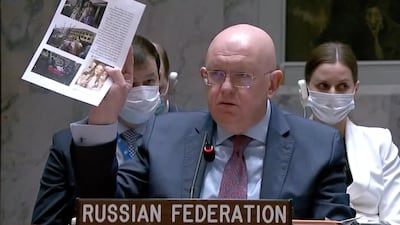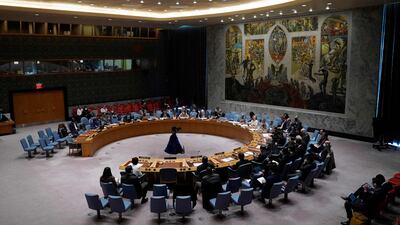Live updates: follow the latest news on Russia-Ukraine
Russia on Friday repeated allegations at the UN Security Council that the US had funded biological weapons laboratories in Ukraine, claims that were flatly rejected by the US and other members of the 15-nation body.
Moscow says it has uncovered evidence of the US funding research into the development of biological weapons in Ukraine, which has been vehemently denied by both Washington and Kyiv.
The US and Ukraine have countered, saying Moscow’s trumped-up claims were a sign that it could soon use such chemical weapons itself. Russian forces have been accused of using prohibited weapons in Syria.
Holding up a bundle of papers, Russia's UN ambassador Vasily Nebenzya said he had “documentary proof” of a $32 million Pentagon scheme to finance biological weapons research in Kyiv, Odesa, Lviv and other parts of Ukraine.
Russian forces discovered documents detailing the scheme left behind after a Ukrainian clean-up operation, with many bearing the signatures of US officials, said Mr Nebenzya.
The documents are available on Russia's Ministry of Defence website, he added.
“Put simply, the Ukraine authorities gave the Pentagon carte blanche on the territory of Ukraine to carry out dangerous biological experiments,” said Mr Nebenzya.
The research included deadly variants of coronavirus, plague, leptospirosis and other diseases as well as methods to spread diseases via animals such as birds, bats, lice and fleas, he said.
Ukraine had allowed a “cynical use of its territory and population for dangerous research which Washington did not [want] to carry out on its own territory”, risking deadly disease outbreaks across Eastern Europe, he added.
Washington’s UN envoy Linda Thomas-Greenfield rejected the Kremlin’s “litany of bombastic and preposterous lies” and “disinformation” that she said were designed to “deflect responsibility for Russia's war of choice”.
“It is Moscow that has long maintained a biological weapons programme in violation of international law, not Ukraine,” she told reporters before the meeting, flanked by ambassadors from Britain, France, Norway and other US allies.
“It is Moscow that has a well-documented history of using chemical weapons, not Ukraine.”
The UN’s disarmament chief Izumi Nakamitsu said she was “not aware of any such biological weapons programme” in Ukraine.
Diplomats met in New York against a backdrop of escalating violence in Ukraine, where Russian missiles on Friday struck an aircraft repair plant near the western city of Lviv, which lies along a key humanitarian supply route and is a hub for refugees from more turbulent parts of the country.
At least 816 civilians have been killed since Russia launched its multi-front assault on Ukraine on February 24, mostly from shelling, missiles, rockets and other strikes, the UN said on Friday. The real figure is expected to be many times higher.
Matthew Saltmarsh, a spokesman for the UN refugee agency, said more than 3.1 million refugees had fled Ukraine and millions more were displaced within its borders. He added that the scale of human suffering was “increasing exponentially”.
Residents of the besieged cities of Mariupol and Sumy faced “potentially fatal shortages of food, water and medicines” while “constant shelling” in the eastern breakaway region of Luhansk had devastated towns and left nearly 100,000 families without power, he said.
Michael Fakhri, a UN investigator on global food supplies, said Russia’s invasion of Ukraine was hitting global supplies from the wheat-producing region and that rising prices were hurting consumers in Egypt, Turkey, Iran and other Middle Eastern importers.
Mohamed Abushahab, the deputy UN ambassador for the UAE, which holds a two-year seat on the council, called for “all diplomatic tools” to be used to “alleviate the suffering of civilians and stop hostilities” in Ukraine.









































